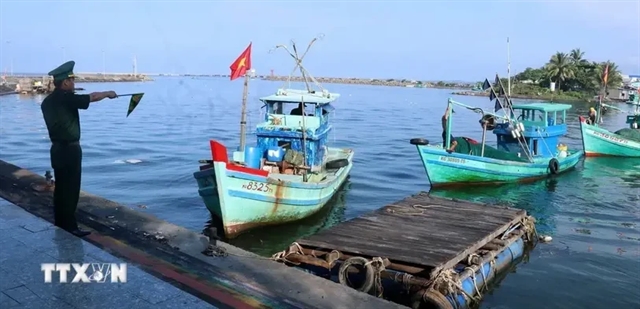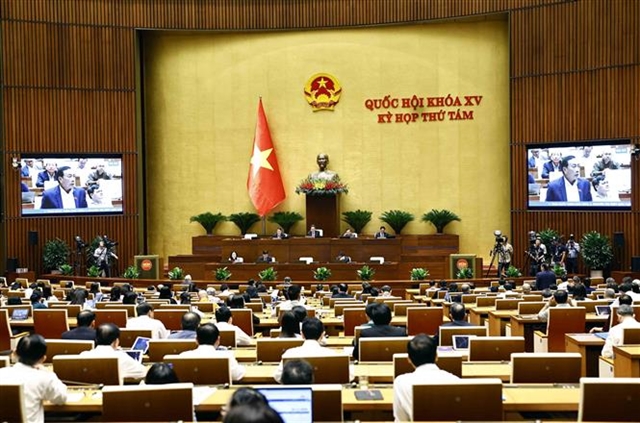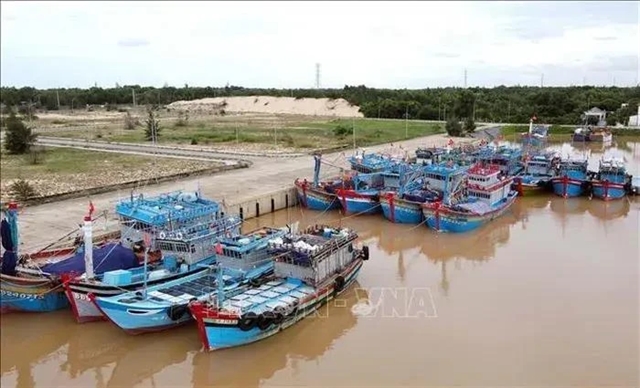Chairman of the provincial People’s Committee Lâm Minh Thanh has asked the provincial Department of Agriculture and Rural Development to complete...
Vous n'êtes pas connecté
- English
- Français
- عربي
- Español
- Deutsch
- Português
- русский язык
- Català
- Italiano
- Nederlands, Vlaams
- Norsk
- فارسی
- বাংলা
- اردو
- Azərbaycan dili
- Bahasa Indonesia
- Հայերեն
- Ελληνικά
- Bosanski jezik
- українська мова
- Íslenska
- Türkmen, Түркмен
- Türkçe
- Shqip
- Eesti keel
- magyar
- Қазақ тілі
- Kalaallisut ; kalaallit oqaasii
- Lietuvių kalba
- Latviešu valoda
- македонски јазик
- Монгол
- Bahasa Melayu ; بهاس ملايو
- ဗမာစာ
- Slovenščina
- тоҷикӣ ; toğikī ; تاجیکی
- ไทย
- O'zbek ; Ўзбек ; أۇزبېك
- Tiếng Việt
- ភាសាខ្មែរ
- རྫོང་ཁ
- Soomaaliga ; af Soomaali
Rubriques :
 Maroc - EURASIAREVIEW.COM - A la une - 16/Sep 23:21
Maroc - EURASIAREVIEW.COM - A la une - 16/Sep 23:21
Thailand: Srettha’s Fisheries Approach Exposes Broader Policy Failures – Analysis
By Prem Singh Gill and Cain Hillier In September 2023, embattled former Thai prime minister Srettha Thavisin and a cadre of ministers visitedSiripairoj Ice Pier, a fishing port in southwest Thailand. While eating green fish ball curry, local fishermen explained to the politicians how stringent regulations on illegal, unreported and unregulated (IUU) fishing created in 2015 to comply with EU export demands had decreased wages and efficiency while levying ruinous fines. To assuage their concerns, Srettha established a newcabinet committeeto address industry stagnation and expressed confidence that 13 laws in the Fisheries Act would be amended in the near future. But several months earlier, Srettha had been at the Elysee Palace with French President Emmanuel Macron, proudly proclaiming that anEU–Thailandfree trade agreementwould be finalisedwithin18months. This timeline was almost undoubtedly contingent on Thailand continuing to uphold the comprehensive reforms it enacted to its fishing industry in response to EU pressure. In August 2024, Srettha wasdismissed from officeby Thailand’s constitutional court for what it found to be agross breach of ethical standardsamidplummetingapproval ratingsand a stagnant Thai economy. The now-former prime minister’s inability to act decisively on the future of Thailand’s commercial fishing industry has proved a bellwether issue. It illustrates why Srettha’s economically liberal and internationalist agenda for Thailand broadly failed for reasons inside and outside of his control. Thailand cracked down on IUU fishing in 2015 to avoid facing a total export ban from the European Union — theworld’s largest trader of fishery and aquacultureproducts. While this has improved labour and sustainability protections, compliance issues and labour shortages have drastically reduced the number of operational fishing vessels. Out of Thailand’s 15,000 seaworthy fishing vessels,only4000–5000are legally operable. Before implementing IUU regulations, Thailand exportedseafood worth 350 billion baht(US$10.4 billion) annually. But after these statutes were implemented, the local industry began to be outcompeted by less-regulated neighbouring states. The decrease in domestic supply has also increased annual seafood imports to 150 billion baht (US$4.4 billion). It’s crucial to note that these statistics primarily reflect the situation for commercial fishery businesses. While the initial reforms were implemented as blanket regulations across the sector, subsequent amendments have aimed to provide remedies specifically for local fishermen. The Thai parliamentunanimously votedto loosen fishing regulations in February 2024 to address pressure on the industry. Draft billshave proposedremoving minimum penaltythresholds for IUU violations and allowing vessels to fish endangered species beyond Thailand’s oceanic borders provided they comply with international maritime law. Other recommendations include removing restrictions on the number of licences per person and expanding the Provincial Fisheries Committee. This near-universal clamour for a Fisheries Act amendment provoked gripes from business owners. Critics have decried the suggestedexclusion of labour management, fearing it could impact Thailand’s evaluation in the Trafficking In Persons Report and weaken monitoring and protection mechanisms. Others have objected to theproposed import duty increaseto 20 baht (US$0.58) per kilogram of seafood as protectionist. There has also been sustained campaigning against deregulation from local and international NGOs. An open letter delivered to Srettha Thavisin’s government on behalf of 84 civil society organisations requested intervention to halt deregulation they say would return Thai fisheries to a culture of economic and sexual exploitation. The key theme of this debate has been comprehensive deliberation and consultation, coupled with demands for patience from the fisheries sector. Srettha’s parliamentary coalition came into power on a mandate to revive the economy, boost trade and tourism and decrease bureaucratic hurdles. But his collaborative and comprehensive approach, emphasising the formation of joint public–private partnerships, has backfired. Slow and steady progresshas not ledto substantial reforms of the Thai economy or clear objectives for Thai trade negotiators to follow in their crucial negotiations with the European Union. The World Bank projects that Thailand’s economy will grow just2.8per centin2024, lagging well behind its Southeast Asian neighbours. Rather than building political capital to finalise legislation, Srettha burnt it through his request for forbearance. Amending the Fisheries Act without alienating any significant domestic interests or losing the EU market takes more time than Srettha, as the leader of a re-emerging but fragile democracy, was ever afforded. In addressing the issue through a measured and inclusive approach, Srettha sacrificed flawed but swift and comprehensive solutions, a trade-off replicated in other areas under his government. Srettha’s approach to fisheries reform exemplifies his administration’s broader predicament. His policies aimed to please all parties whilst satisfying none — caught between local industry demands, international obligations and economic aspirations. The transition from Srettha to new prime minister Paetongtarn Shinawatra is unlikely to significantly alter the country’s fisheries reform policy given their shared Pheu Thai party affiliation. Paetongtarn’s administration still faces the complex challenge of balancing local industry demands with international commitments, particularly EU requirements. The new leadership must also address concerns about labour protections and environmental sustainability while pursuing economic liberalisation. As Paetongtarn’s tenure begins, her approach to prioritising and navigating these challenges remains to be seen. What is clear is that Srettha’s balancing act was unsuccessful, leaving key fisheries issues unresolved in the middle of a vital trade negotiation and putting Thailand’s economic revival in limbo. About the authors: Prem Singh Gill is Visiting Scholar at the Faculty of Law, Universitas Muhammadiyah Yogyakarta, Indonesia. Cain Hillier is Junior Researcher at the European Institute of Asian Studies. Source: This article was published at East Asia Forum
Articles similaires
Thailand: Ruling Party Has Lost Credibility After Reneging On Lèse-Majesté Cases – Analysis
By Nontarat Phaicharoen Thailand’s ruling Pheu Thai Party has lost its trust with citizens by breaking with an electoral promise of including...
Thailand to raise retirement age to 65
Thailand's Labour Ministry plans to raise the retirement age for both private and government sectors to 65 years, the same as in Singapore and...
Ministers outline plans for education, labour, agriculture at current NA session
Minister of Agriculture and Rural Development Lê Minh Hoan noted that the Prime Minister recently issued a dispatch outlining urgent tasks and...
Quảng Bình tightens monitoring of port throughput in anti-IUU efforts
Accordingly, it is necessary for them to organise strict supervision of seafood purchasing facilities in the area, ensuring that 100 per cent of the...
Australia finalises trade deal with UAE
The Australia-UAE Comprehensive Economic Partnership Agreement (CEPA) has been signed, with minister for agriculture, fisheries and forestry, Julie...
Siam Paragon Bangkok International Fashion Week 2024 Unveils the best of Thai and Asian Creativity And Reaffirms Siam Paragon As the Number One 'Luxury Destination'
BANGKOK, THAILAND - Media OutReach Newswire - 1 November 2024 - Siam Paragon reaffirms its positioning as a leading 'global luxury destination' and...
Myanmar Faces Manifold Crises As Military Conscription Drives Mass Exodus – Analysis
By Soe Nandar Linn Since the 2021 coup,the people of Myanmar have endured a severe economic downturn,human rights violationsand mass displacement...
TCCF: Thailand Unveils Plans For THACCA Content Agency; Including New Film Festival, Funding & Export Drive
Thailand has unveiled plans for its new content agency, Thailand Creative Culture Agency (THACCA), including a new international film festival,...
Thailand: Time Runs Out For Justice In Tak Bai Massacre – Analysis
By Don Pathan It was always a long shot but Malay Muslims in Thailand’s southern border region never gave up hope that the government would...
Les derniers communiqués
-
Adobe Brings Conversational AI to Trillions of PDFs with the New AI Assistant in Reader and Acrobat
Adobe - 21/02/2024
-
Laura Frigenti takes the Helm as Chief Executive Officer of the Global Partnership for Education
Global Partnership for Education - 05/12/2022





